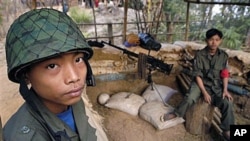The International Labor Organization (ILO) says it is encouraged by proposed legislation in Burma to allow greater freedom for labor unions, but remains concerned about the use of forced child labor in the military and private sector.
The ILO representative in Burma, Steve Marshall, speaking to reporters Tuesday, said Burma’s military is preparing legislation that will allow for legal trade unions, with rights to strike. Marshall said this is a further step in signs of economic reform.
The legislation is set to be presented before a new parliament elected last November and due to hold its first session in late January. Marshall said the legislation marks a major step in the country’s labor rights.
"Obviously, the issue of freedom of association, which is effectively the right of workers and people to be represented which includes the issues of, for example, collective bargaining, it would include the issues of the right to strike ... they are critical and if passed into law make a big change in terms of the way in which the society is able to develop," said Marshall.
The military government in Burma, also known as Myanmar, already has ratified the internationally recognized Freedom of Association Convention, which is the standard set by the ILO.
Marshall says, though, that while the introduction of the legislation is a step towards an improved labor market in Burma, the overall reform program remains in its early days.
Human rights groups say while unions and associations have been a feature of Burma’s economic and political life, they have been tightly regulated by the military.
Trade unionists also have been jailed for activities "not sanctioned’ by the military." Thailand-based rights group, Assistance Association for Political Prisoners (Burma), says of the more than 2,100 political prisoners currently detained, 44 are labor activists.
The ILO’s chief goal in Burma has been to assist in ending forced labor and it has an agreement with the military government that enables complaints to be lodged with the organization’s country offices. Last year the ILO received 370 complaints, marking a sharp increase over recent years.
Marshall said the ILO remains concerned over ongoing issues of child labor and recruitment of child soldiers into Burma’s armed forces. He said there have been signs of progress in dealings with the armed forces.
"In the area of child soldiers - yes - there is a general positive move," said Marshall. "In the last year, for example, 73 children - as a result of complaints made to the ILO - were released and discharged from the military."
The military government recently announced a program of national military service for both men and women that may come into effect beginning in 2012.
Burma’s army, faced with problems of recruitment and desertion, has looked to underage recruitment using labor brokers. Marshall said the proposed national service is expected to have a direct impact on child recruits.
Marshall added that many children often are lured into forced labor due to poverty when families are unable to pay for the child’s education.
But forced labor remains a major problem across Burma, with rights groups citing villages forced to construct roads and other work for the military, while jailed prisoners also are recruited for local industries.
A further assessment of Burma’s labor practices is expected to take place in February, when an ILO mission, including labor specialists, will appraise the reforms and new labor legislation.
ILO Welcomes Burma's Proposed New Labor Laws
- By Ron Corben




